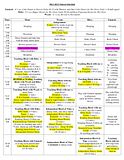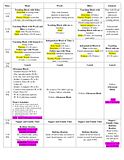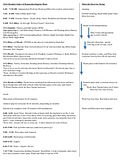Page 1 of 1
How do you keep track of your more independent students?
Posted: Thu Aug 30, 2012 3:55 pm
by Bramble
My 11 yr. old is using CTC. We are just one week in. I want to be sure to keep up on checking his work. How do you all do this? Do you skim every box and then check everything they did that wasn't just listening/reading? I was thinking of giving him a checklist for the subjects and having him highlight the subjects that had work for me to look at for the day. Or have him put the work in a basket for me to look over. Do you have a meeting time? How do you keep up? Links to past threads are fine, too. No need to write me a personal message.

Thanks!
Re: How do you keep track of your more independent students?
Posted: Thu Aug 30, 2012 4:23 pm
by water2wine
I meet with them at the end of the day and they have to show me all their work for HOD. They also narrate to me their independent reading. They use the guidebook as their list of what to do. I do make a spread sheet for anything that is not HOD. It doesn't take long to do the checking of their work, you just have to stay on it and get into that daily habit. I try to use what HOD has done for me as much as possible. Just keeps things simple.

Re: How do you keep track of your more independent students?
Posted: Thu Aug 30, 2012 4:56 pm
by SouthernMrs
I found an Excel checklist in the files of the yahoo group and I made one for CTC and will make one for MtMM when I get the guide. I have the skeleton in tact, so it will be easy to plug in the things I need/want to check up on.
Re: How do you keep track of your more independent students?
Posted: Fri Aug 31, 2012 6:08 am
by 4Hispraise
I have a weekly checklist that I laminated & he uses a dry erase marker to check completed tasks. At the end of the week, he erases the check sheet and is good to go. I also meet with him once in the morning for 15 minutes to discuss what he did in Bible quiet time and history (typically, he gives an oral narration on days he does not have a written narration). Then, we meet again when we meet after lunch to complete the teacher-directed activities. At that time, I check all the independent work, ask any questions and make sure he is on track.
Re: How do you keep track of your more independent students?
Posted: Fri Aug 31, 2012 6:44 am
by Motherjoy
My 14yo narrates to me, I edit his written narrations and check his English work. I look over other things very seldomly, perhaps once a month. He writes what he's done in my planner, so I can look there as well.
Re: How do you keep track of your more independent students?
Posted: Fri Aug 31, 2012 10:59 am
by my3sons
We have a meeting time together, and we both look forward to it!

Basically, I have my teaching times in blocks, and he has his independent times in blocks. We have a meeting time to go through his work together, and do any follow-ups. Doing this all in a block or several planned blocks cuts down on interruptions for me teaching other dc and for him doing his work. Here are a few links where this is explained...
viewtopic.php?f=6&t=10939
viewtopic.php?f=6&t=12123&p=87698
My ds uses his HOD guide as his planner. He checks off the corner of each box as he finishes it. This helps me quickly see at a glance when I am meeting with him what we need to go through at our time together, and what we need to chat about him finishing. I also give him his own printed schedule, which is more of a routine than an exact schedule...
Schedule format at start of year...


Routine Format used once in the swing of things...

HTH!
In Christ,
Julie
Re: How do you keep track of your more independent students?
Posted: Fri Aug 31, 2012 11:06 am
by Mumkins
I have a checklist. It includes all school subjects and chores. For example, it starts off:
Brush teeth
Make bed
Clothes in laundry
and then goes on to list his school subjects in the order he's to do them.
Last year I did just school subjects and I had the list divided into "mom" Which means it was something that was teacher directed, "With mom" which was stuff he needed to do with me, like English and math. And then "On my own" which meant he didn't need any help. That helped him see what he could do when I was busy.



